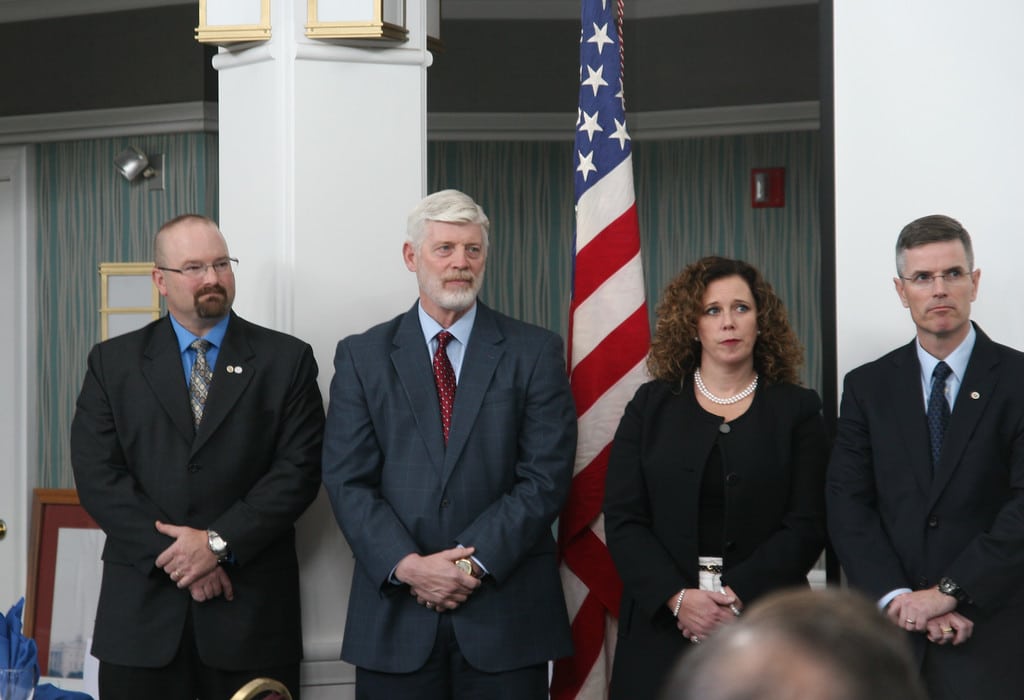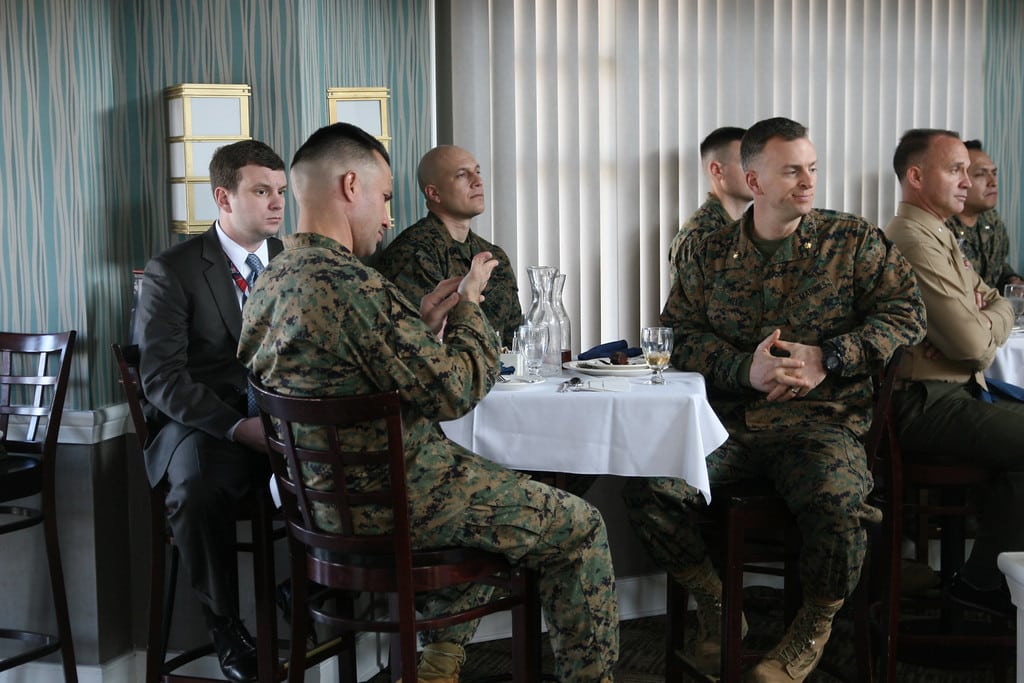Marine Corps Communication-Electronics School (MCCES) is the Marine Corps training ground for the majority of the communications and air/ground electronic maintenance Military Occupational Specialties (MOS). MCCES is based at the Marine Corps Air Ground Combat Center Twentynine Palms, California.
Mission
MCCES Video - Introduction - A short glimpse of the Marine Corps Communication-Electronics School (MCCES) based at the Marine Corps Air Ground Combat Center Twentynine Palms, ...
To train Marines in ground electronics maintenance, tactical communications, and air control/anti-air warfare operations and maintenance in order to ensure commanders at all levels within the Marine Corps have the ability to exercise command and control throughout the operational environment; and to participate in technical and logistical evaluations for new communication. electronic maintenance, air control, and anti-air warfare systems in support of fielding and training.
Tasks
- Conduct formal, MOS qualification and sentiment training in Communication-Electronics Maintenance, Operational Communications, Air Control and Anti-Air Warfare Operations
- Act as C4 Training and Education Center of Excellence in order to coordinate solutions to training requirements for the C4 occupational fields.
- Participate in technical and logistical evaluations of new communications, electronic maintenance, Air Control and Anti-Air Warfare systems in order to develop formal training to support the fielding of these systems throughout the Marine Corps.
History

Beginnings
MCCES began as the Pigeon and Flag Handler Platoon in 1932. On October 5, 1942, it was activated as the Signal School under the Signal Battalion in Quantico, VA. In 1943 they moved to Camp Lejeune, NC; remained there until the end of WWII and eventually offered 15 courses in the communications field. In August 1946, the school was relocated to Camp Del Mar on Camp Pendleton, CA. In December 1949, Signal School was re-designated as Signal and Tracked Vehicle School Battalion. In 1950, coinciding with the Korean War, the school was moved to MCRD San Diego, CA and was renamed to Signal School Battalion in September. During this time, the school added technician and repairmen training. In 1953, the school was re designated to Communication-Electronics School Battalion.
Modern Day
In 1963 the school began to move to Marine Corps Base, Twentynine Palms, CA with the move of C and E Companies. In February 1971 the school was redesignated as to it current title of Marine Corps Communication-Electronics School and A and D Companies moved to Twentynine Palms at this time. Also during this time an Officer Training course was developed for Air Defense Officer and the school trained over 5000 Marines Annually. In 1975, B Company moved from Camp Pendleton, completing the move of the school and establishing the largest formal school in the Marine Corps. In 2002 the MOS redesignation of Data Systems Marines from the 40 occupational fields into the 06 occupational field was completed. In 2003 D Company merged into B Company then D Company was dissolved. In 2005 The average student population was 1,240. The School conducts 44 separate courses producing 37 MOS's. 303 classes are scheduled annually varying from 2 to 54 weeks in duration. This represents upwards of 25,000 academic days. MCCES graduates nearly 6,500 personnel annually. C&E our local/colloquial term) has played a vital role in the Corps' combat- readiness; recognized as such in the form of unit awards to include; American Campaign Streamer, World War II Victory Streamer, National Defense Service Streamer w/3 Bronze Stars, Meritorious Unit Commendation w/3 Bronze Stars, Global War on Terrorism Service Streamer. MCCES currently consist of a Headquarters Company and 3 training companies/schools which are: Company A/CEMS (Communication-Electronics Maintenance School, Company B/TCTS (Tactical Communications Training School), Company C/Air School). 2006 The on board average student population was 1042. The School conducted 56 separate courses producing 35 MOS's. 51 of these courses were conducted at the Formal Learning Center (FLC) and 5 by Mobile Training Teams. 2011 In August the Commanding Officer of MCCES officially became the reporting senior for; CO, Communication School, MCB, Quantico, Virginia; CO, Marine Detachment Fort Gordon, Georgia; CO, Low Altitude Air Defense School, Fort Bliss, Texas and Marine Corps Representative, Sheppard AFB, Texas. MCCES continues to carry out its primary mission to train personnel in the fields of operational communications, communications-electronics maintenance, and air control/anti-air warfare operations. On 5 April 2013 Air Control Training Squadron(ACTS) was activated under MCCES. The former Charlie Company has been redesignated as Detachment Bravo and the former Alpha Company has been designated as Detachment Alpha under the Air Control Training Squadron which is reportable to the Commanding Officer, MCCES.
Schools

Communication Electronics Maintenance School (ACTS-Company A)
The Communication-Electronics Maintenance School (CEMS) is responsible for training the 2800 MOS field.
Radio Maintenance Training Section (RMTS)
Ground Radio Repair Course (GRRC)
The Ground Radio Repair Course teaches analysis, troubleshooting, maintenance, restoration, and repair of ground transmission systems line-replaceable units to the shop replaceable unit and chassis-mounted component-level to entry-level Marines.
Digital Wideband Repair Course (DWRC)
The Digital Wideband Repair Course teaches principles of digital and microwave communications, multi-channel transmission principles, FM transceivers, satellite communications theory, and component level troubleshooting to entry-level Marines.
Tactical Remote Sensor System Maintenance Course (TRSSMC)
The Tactical Remote Sensor System Maintenance Course teaches installation, testing, circuit analysis, and troubleshooting of the Tactical Remote Sensor System to Marines who already have a required Military Occupational Specialty
Electronic Fundamentals Training Section (EFTS)
Basic Electronics Course
The Basic Electronics Course teaches basic electricity, electronics, digital logic, computer operation, circuit principles, troubleshooting, and soldering. It prepares entry-level Marines to attend follow-on electronic equipment repair courses.
All Marines entering the 28xx or 59xx fields are required to pass BEC.
Advanced Electronics Course
The Advanced Electronics Course teaches advanced electronics and circuit theory, circuit simulation and analysis, and advanced logical troubleshooting. It prepares career-level Marines to attend a follow-on advanced electronic equipment repair course.
Miniature/Microminiature/Automated Test Equipment Repair Course (MM/ATEC)
The Micro-Miniature Automated Test Equipment Course teaches entry-level and Fleet Marines to use automated test equipment to isolate faults on circuit card assemblies, develop test routines for various circuit card assemblies, and then repair them using advanced soldering techniques including miniature and microminiature surface mount, plated-through hole, and wire termination techniques and fundamentals. The "2M" Technicians produced in this course will also have the ability to repair, reconstruct, and resurface laminates and other various surface types that are used in circuit cards.
Terminal Equipment Training Section (TETS)
Telephone System and Personal Computer Repair Course (TSPCRC)
The Telephone Systems Personal Computer Repair Course teaches theory, circuit analysis, operation, troubleshooting, restoration, and repair of telephone systems, computers, computer peripherals, and cryptographic equipment to entry-level Marines.
Technical Controller Course (TCC)
The Technical Control Course teaches theory of telecommunication networks, planning, installation, integration, operation, troubleshooting, and restoration of communication networks to entry-level Marines using a Digital Technical Control Facility.
Tactical Communications Training School (Company B)
TCTS is responsible for training communications systems operators. TCTS trains Marines in the 06xx MOS field such as 0621 Field Radio Operators, 0651 Cyber Network Operators, etc.
Cyber Systems Training Section (CSTS)
To train Marines to support the Marine Corps mission to install, operate, maintain, and secure cybers network systems including computer hardware and software.
Switching Training Section (STS)
The section provides instruction on installation, operation, and maintenance on command and control switching systems that provide classified and unclassified voice communication. During this course the students will be taught basic installation and mainte
Transmission Training Section (TTS)
To provide instruction for the installation and operation of various tactical FMF radio equipment.
AIRS (ACTS_ Company C)
AIRS trains Marines in the 5900, 7200
Air Support Training Section (ASTS)
Focuses on net/radio operator training and information flow requirements throughout the Marine Air Command and Control System (MACCS) related to offensive air support and assault support operations by performing as operators for information flow and controllers of fixed and rotary wing aircraft. The mission is to train operations operators and control officers to a certain military occupational specialty (MOS) readiness percentage and end-state is to provide Direct Air Support Center (DASC) Marines to the Fleet Marine Forces (FMF). Operator MOS's are identified by the numbers 7200. Air support operator Marines have the MOS of 7242.
Air Defense Training Section (ADTS)
ADTS focuses on Anti-Air Warfare operations as well as fundamental Tactical Air Operations Center (TAOC) operations. Air defense operator Marines have the MOS of 7234 and 7236.
Low Altitude Air Defense Training (LAAD) Section
The LAAD Training Sections focuses the on the employment of the Stinger Missile. LAAD Marines hold the MOS 7212 and 7204
Radar Maintenance Training Section (RDRMTS)
This course instructs current radar repairman in the advance fundamental concepts of radar theory and the foundational building blocks of radars in preparation for advanced training in ground or aviation radar systems.
Tactical Data Systems Training Section (TDSTS)
TDSTS is built of three main sections, Aviation Communications Systems Training Unit (ACSTU - 5974), Tactical Aviation Command Technician Unit (TACTU - 5939), and Tactical Aviation Operation Center (TAOC - 5979). Each course is a follow of Alpha Company MOS training and has the MOS identifier of 5900.
Unit awards

A unit citation or commendation is an award bestowed upon an organization for the action cited. Members of the unit who participated in said actions are allowed to wear on their uniforms the awarded unit citation. The unit is authorized to fly the appropriate streamer on its organizational flag. The Marine Corps Communications-Electronics School has been presented with the following awards:
External links

- MCCES Official Homepage
See also
- Quantico, VA
- Marine Corps Air Ground Combat Center Twentynine Palms
- 06xx MOS Field
- 28xx MOS Field
- 59xx MOS Field
- 72xx MOS Field

Wonderful post,I discovered this image so amazing and in this image, they are demonstrating their appreciation and modeling for the image and get info to click on https://www.mbaessaywriting.net/ if you wanna to get quality work. It is an exceptionally troublesome assignment to speak to the story with the photos however you did the wonderful employment to show this story extraordinarily.
ReplyDeleteExcellent post,As of late, I visit your site and I see that you are completing an incredible occupation and consistently you come up the exceptional thought and here is check out http://www.personalstatementwritingservice.net/best-personal-statement-example/best-event-management-personal-statement-examples/ for good work. The progression you took toward the begin was great and you're sure idea brings you at this stage. Just a couple of individuals come at this stage and need that keep your spirit up for this reason and you acquire more notoriety.
ReplyDeleteGood post,The bug programming is fundamental for the software engineers to discover the flaws and blunders but you can get click here for best work. Be that as it may, this kind of the product isn't anything but difficult to use and developers possess no energy for utilized this sort of programming. In any case, you are giving this product which is extremely helpful and simple to utilize.
ReplyDelete